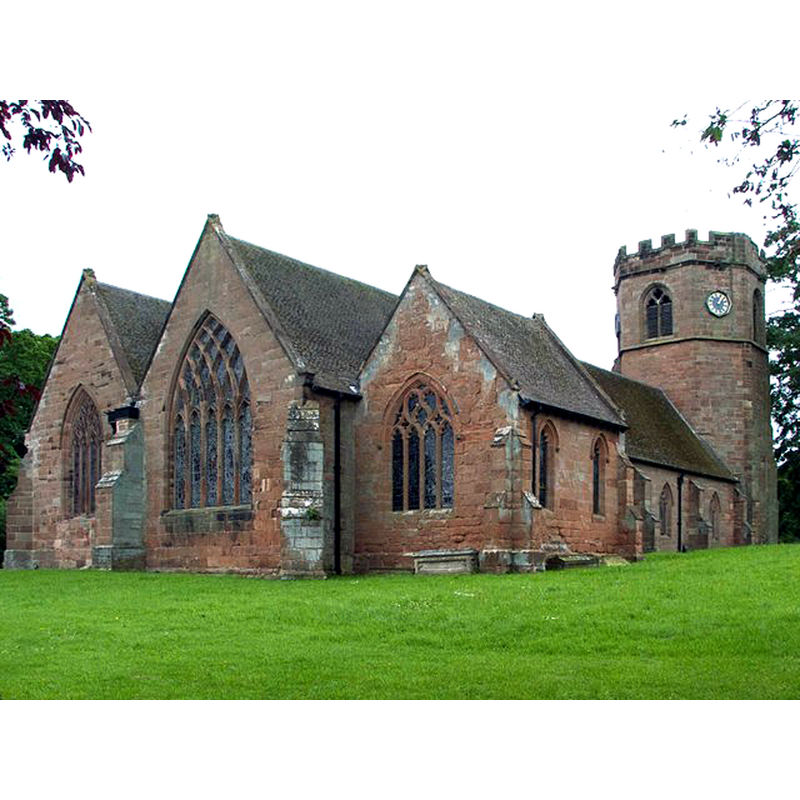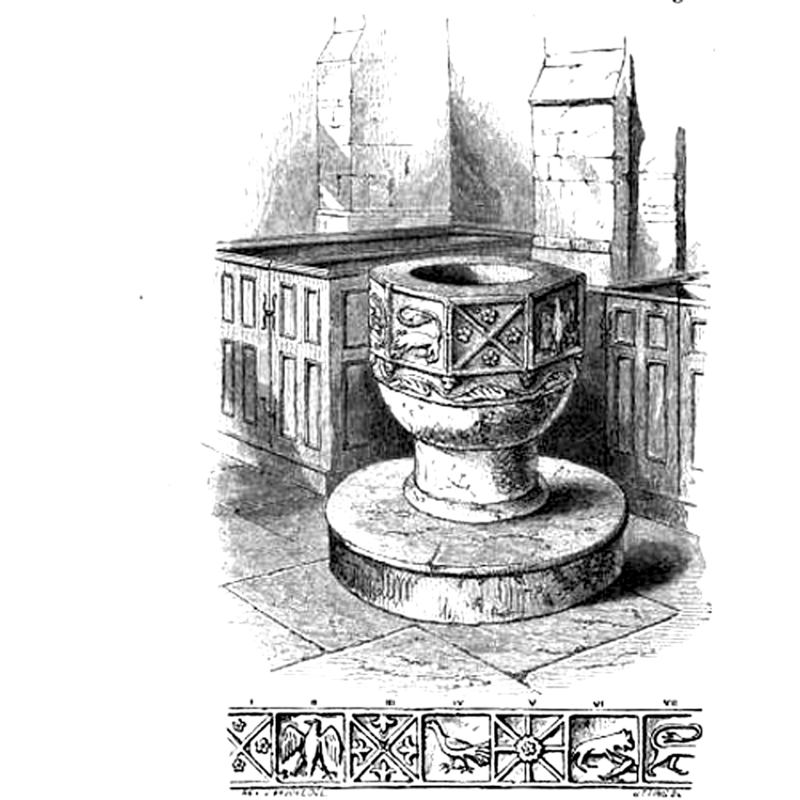Hodnet / Odenet
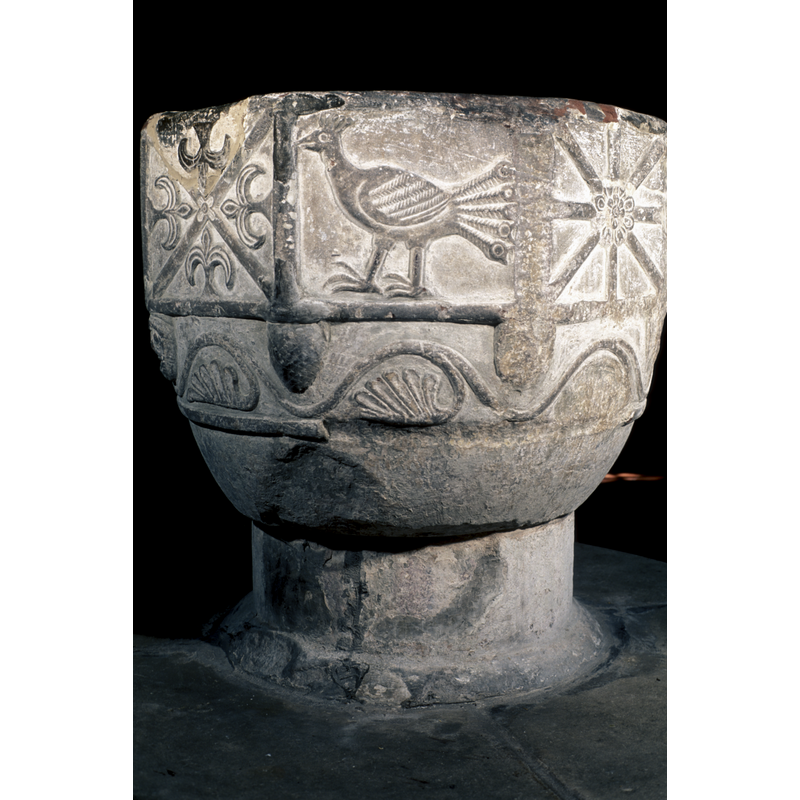
Image copyright © Baptisteria Sacra Index, 2023
CC-BY-NC-ND-4.0
Results: 23 records
B01: animal - mammal - cat - catching a mouse
Scene Description: Large cat-like feline about to catch a minute and squalid four-legged animal which looks more like a lizard than a mouse
Copyright Statement: Image copyright © Baptisteria Sacra Index, 2023
Image Source: digital image of a photograph taken 17 July 2000 by BSI
Copyright Instructions: CC-BY-NC-ND-4.0
B02: animal - mammal - lion - passant
B03: animal - mammal - lion - passant
B04: design element - motifs - floral - rosette - 5-petal - 4
B05: animal - bird - eagle - wings spread
B06: design element - motifs - floral - fleur-de-lis - 4
B07: animal - bird - peacock - passant
B08: design element - motifs - floral - rosette - radiated frame
Scene Description: could be read as a rosette in the intersection of two crosses (saltire + Greek) in a Union Jack-like arrangement
Copyright Statement: Image copyright © Baptisteria Sacra Index, 2023
Image Source: digital image of a photograph taken 17 July 2000 by BSI
Copyright Instructions: CC-BY-NC-ND-4.0
view of font
view of font
view of font
view of font
design element - motifs - roll moulding
design element - motifs - roll moulding
design element - motifs - moulding and piping
design element - motifs - vine - acanthus
Scene Description: all around the lower basin sides -- notice also the damage shown here at various levels: the upper left panel has large damage which may have resulted from a metal staple from an old cover; the whole piping moulding on the right is practically missing, as is part of the roll moulding below; there is also considerable damage to the underbowl, below left
Copyright Statement: Image copyright © Baptisteria Sacra Index, 2023
Image Source: digital image of a photograph taken 17 July 2000 by BSI
Copyright Instructions: CC-BY-NC-ND-4.0
symbol - fruit - grapes? (arum?) - 4
Scene Description: alternating with the four human heads in the down ondulations of an acanthus vine -- one of them seen here in the centre; one other is damaged, broken off
Copyright Statement: Image copyright © Baptisteria Sacra Index, 2023
Image Source: digital image of a photograph taken 17 July 2000 by BSI
Copyright Instructions: CC-BY-NC-ND-4.0
human figure - head - 4?
Scene Description: alternating with pine-cone like motifs in the down ondulations of an acanthus vine -- two of the heads are visible here, at left and right; one other is damaged, broken off
Copyright Statement: Image copyright © Baptisteria Sacra Index, 2023
Image Source: digital image of a photograph taken 17 July 2000 by BSI
Copyright Instructions: CC-BY-NC-ND-4.0
view of church exterior - northeast view
Copyright Statement: Image copyright © David Dixon, 2011
Image Source: edited detail of a digital photograph taken 9 August 2011 by David Dixon [www.geograph.org.uk/photo/2552173] [accessed 19 Nvovember 2016]
Copyright Instructions: CC-BY-SA-2.0
view of church exterior - southeast view
Scene Description: Source caption: "St Luke's Church, Hodnet [...] The oldest part of the building (the south isle) dates from the 12th century. In the 14th century the church was remodelled, with the south isle chapel, nave, chancel and rare three-stage octagonal tower added. The church was restored in the latter half of the nineteenth century."
Copyright Statement: Image copyright © David Dixon, 2011
Image Source: edited detail of a digital photograph taken 9 August 2011 by David Dixon [www.geograph.org.uk/photo/2552178] [accessed 19 Nvovember 2016]
Copyright Instructions: CC-BY-SA-2.0
view of church exterior - northeast view
Copyright Statement: Image copyright © Mike White, 2009
Image Source: digital photograph taken 27 May 2009 by Mike White [www.geograph.org.uk/photo/1323622] [accessed 19 November 2016]
Copyright Instructions: CC-BY-SA-2.0
view of font in context
design element - motifs - moulding
INFORMATION
Font ID: 02488HOD
Object Type: Baptismal Font1
Date Visited: 2000-07-17
Font Century and Period/Style: 12th - 13th century [re-carved in the 17th century], Medieval [altered]
Church / Chapel Name: Parish Church of St. Luke
Font Location in Church: Inside the church
Church Patron Saint(s): St. Luke
Church Notes: original church pre-Conquest; present church 12thC; remodelled 14th, 19thC
Church Address: Church Street, Hodnet, Market Drayton TF9 3NL, UK -- Tel.: +44 1630 685491
Site Location: Shropshire, West Midlands, England, United Kingdom
Directions to Site: Located off the A53m 13 kms N of Shrewsbury
Ecclesiastic Region: Diocese of Lichfield
Historical Region: Hundred of Hodnet
Additional Comments: altered font / re-carved font (12thC font re-carved 17thC?) -- disappeared font? (the one from the pre-Conquest church here)
Font Notes:
Click to view
There is antry for Hodnet [variant spelling] in the Domesday survey [http://opendomesday.org/place/SJ6128/hodnet/] [accessed 19 November 2016]; it mentions a priest and a church in it. A font here is illustrated in Anderson (1864), who notes the church as being "a Saxon foundation" mentioned in Domesday. Listed in Cox & Harvey (1907) as a noteworthy baptismal font of the Norman period. Newman & Pevsner (2006) suggest: "probably C12 in origin but embellished later, perhaps in the C17. Norman foliage motifs and Norman-looking lions and rosettes. But the cock and the spread eagle cannot possibly be Norman, nor is the placing of the motifs in the panels convincing." On-site notes: the Hodnet font has been called Norman and, on several occasions, assigned an early date, but the shape and ornamentation, especially the eagle on one of the basin sides, etc., point to a later date, as pointed out in Newman & Pevsner above. The upper outer part of the basin is octagonal, the lower rounded; the sides of the basin have: 1)a cat about to catch a mouse; 2)a lion facing right; 3)a lion facing left; 4)four rosettes; 5)a heraldic eagle; 6)four fleur-de-lis, each in one of the spaces of a large "X"; 7)a peacock facing left; 8)a Latin cross over St. Andrew's cross with rosette in the centre. The lower part of the basin sides is encircled by a large vine and, at each corner of the upper sides, a human head or a bunch of grapes. alternating. The underbowl is plain. The base is plain, short and cylindrical. The whole basin has been whitewashed, but the red sandstone, said to be from a local quarry, appears underneath the paint. Tisdall (1998?) shows part of the side in which a cat catches a smaller long-tailed animal, probably a mouse or a rat, and captions it: "The Devil catches the unwary soul"; the eagle with wings spread is captioned: "The start of a new spiritual life with the help of the Holy Spirit." [NB: if the carving were of the same date as the font it the font could not be Norman, but it could be as Newman & Pevsner suggest, a 17th-century re-carving of an older font - The church goes back to Anglo-Saxon times but we have no information of an earlier font of that church].
COORDINATES
UTM: 30U 528451 5856076
Latitude & Longitude (Decimal): 52.853669, -2.577486
Latitude & Longitude (DMS): 52° 51′ 13.21″ N, 2° 34′ 38.95″ W
MEDIUM AND MEASUREMENTS
Material: stone, sandstone (red local stone)
Number of Pieces: two
Font Shape: tub-shaped, mounted
Basin Interior Shape: round
Basin Exterior Shape: octagonal
Drainage System: centre hole in basin
Drainage Notes: lead-lined
Rim Thickness: 16-18 cm (19-20 cm at the angles)
Diameter (inside rim): 55 cm
Diameter (includes rim): 88 x 95 cm (min.&max. diagonals)
Basin Depth: 25 cm
Height of Basin Side: 32 cm
Basin Total Height: 70 cm
Height of Base: 25 cm
Basin Upper Panel Dimensions: 32 x 36 cm
Font Height (less Plinth): 95 cm
Font Height (with Plinth): 110 cm
Notes on Measurements: BSI on-site
REFERENCES
- Anderson, John Corbet, Shropshire, its early history and antiquities, comprising […], London: Willis and Sotheran, 1864, p. 378-379
- Cox, John Charles, English Church Furniture, New York: E.P. Dutton & Co., 1907, p. 215
- Newman, John, Shropshire, New Haven: Yale University Press, 2006, p. 301
- Tisdall, M. W., God's beasts: identify and understand animals in church carvings, England: Charlesfort Press, 1998?, ill. 74, p. 43; ill. 149, p. 77; ill. 386, p. 194
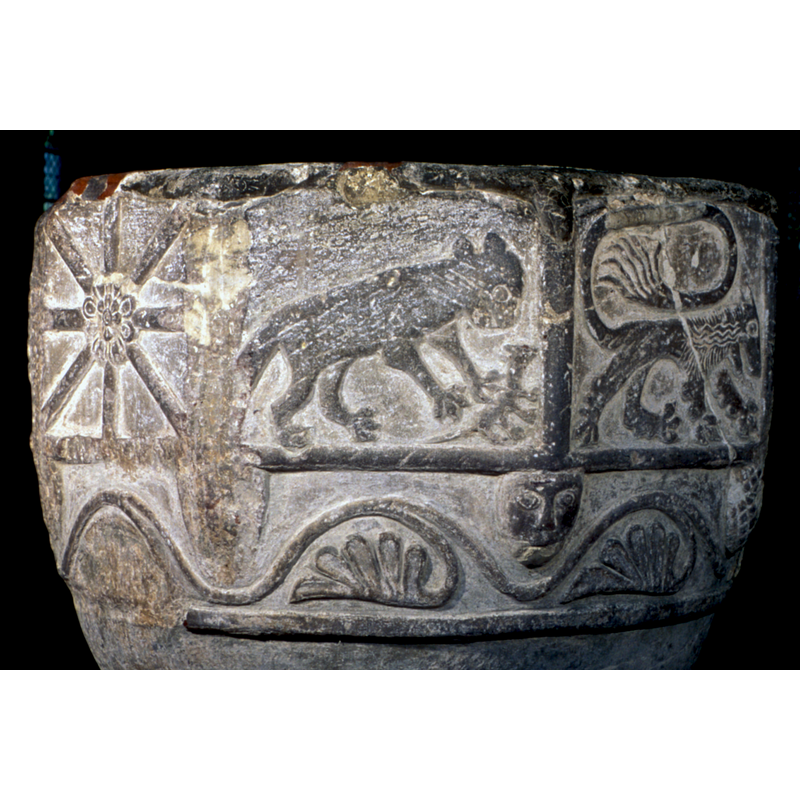
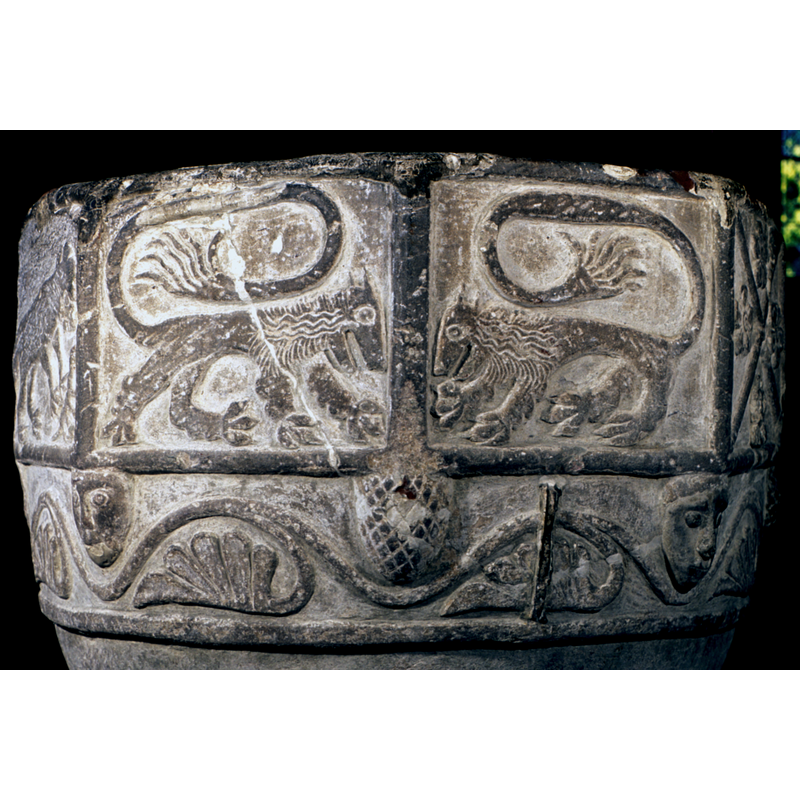
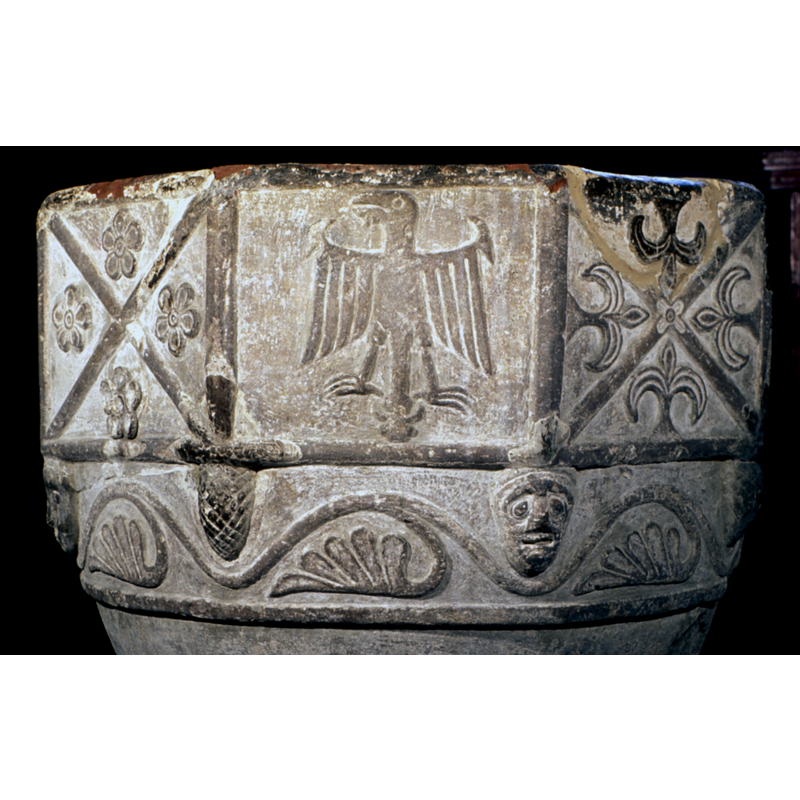
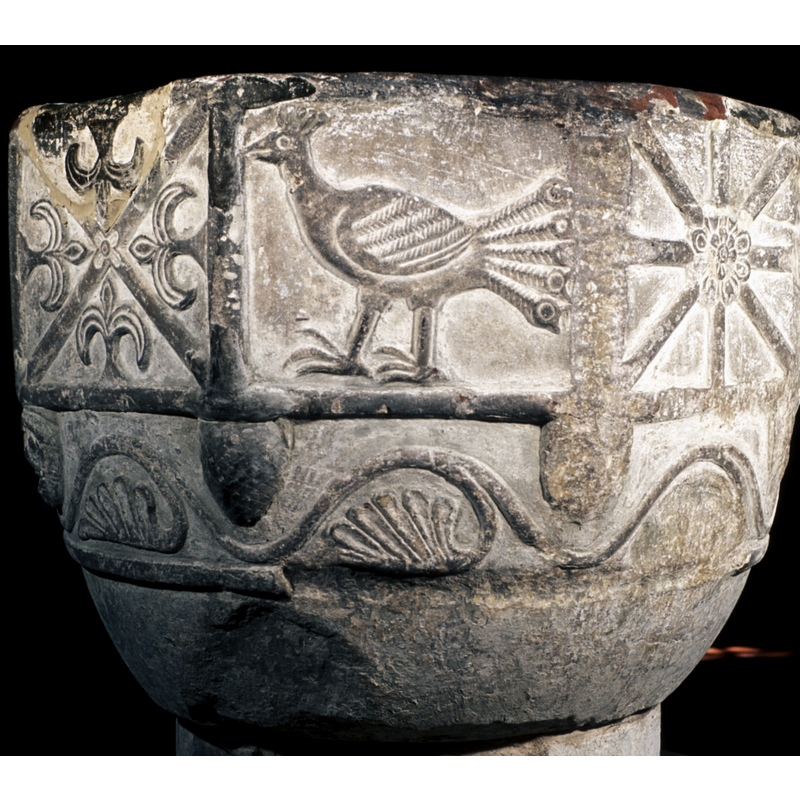
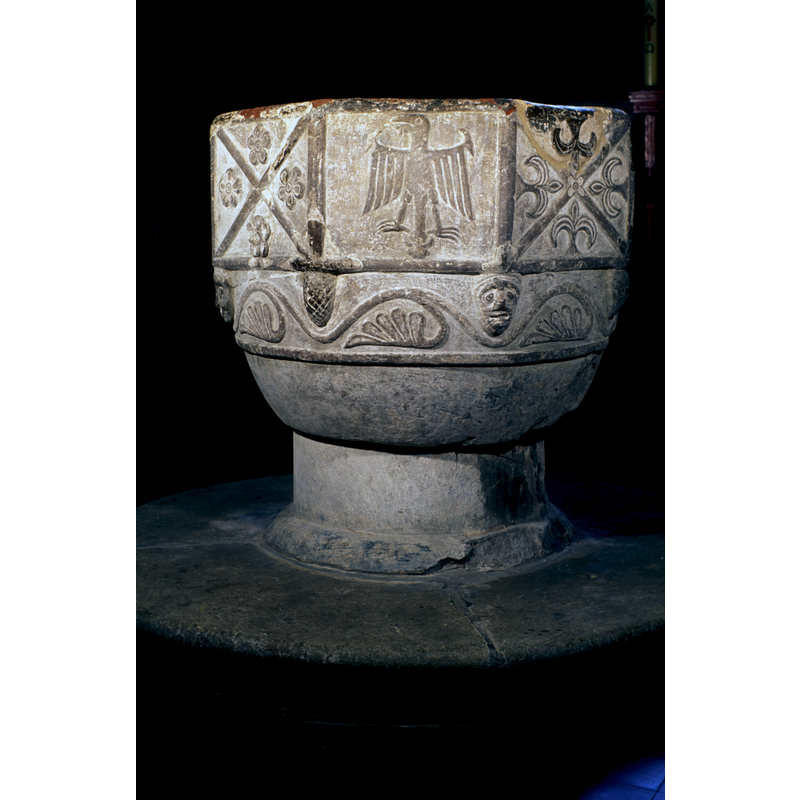
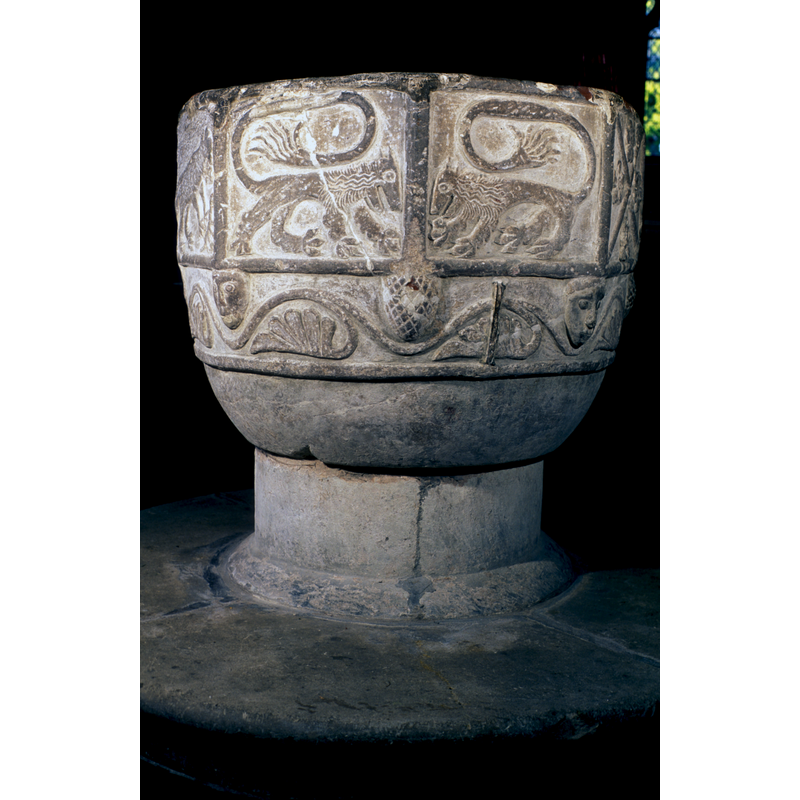
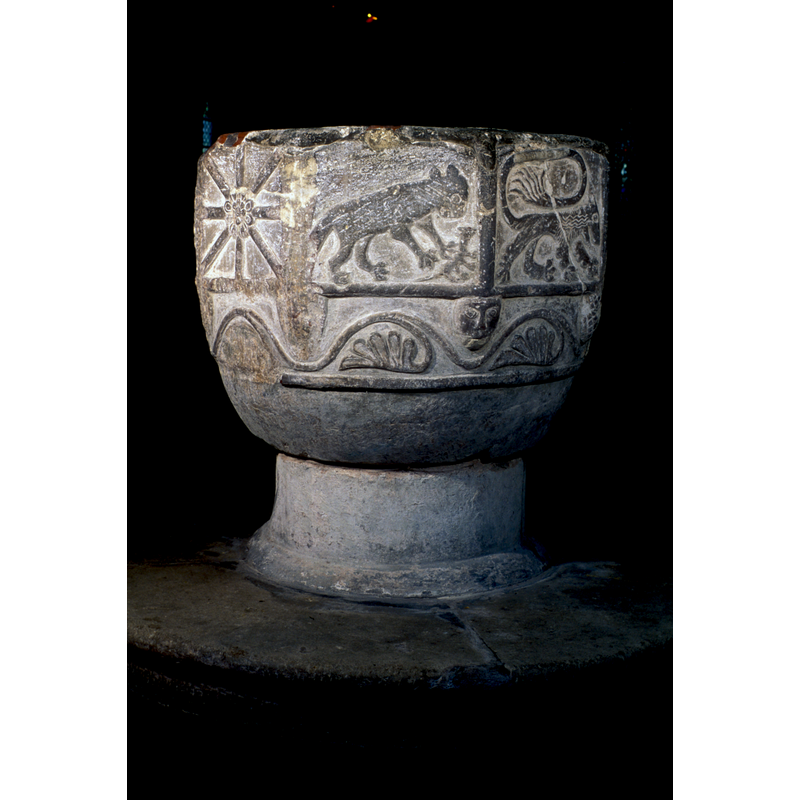
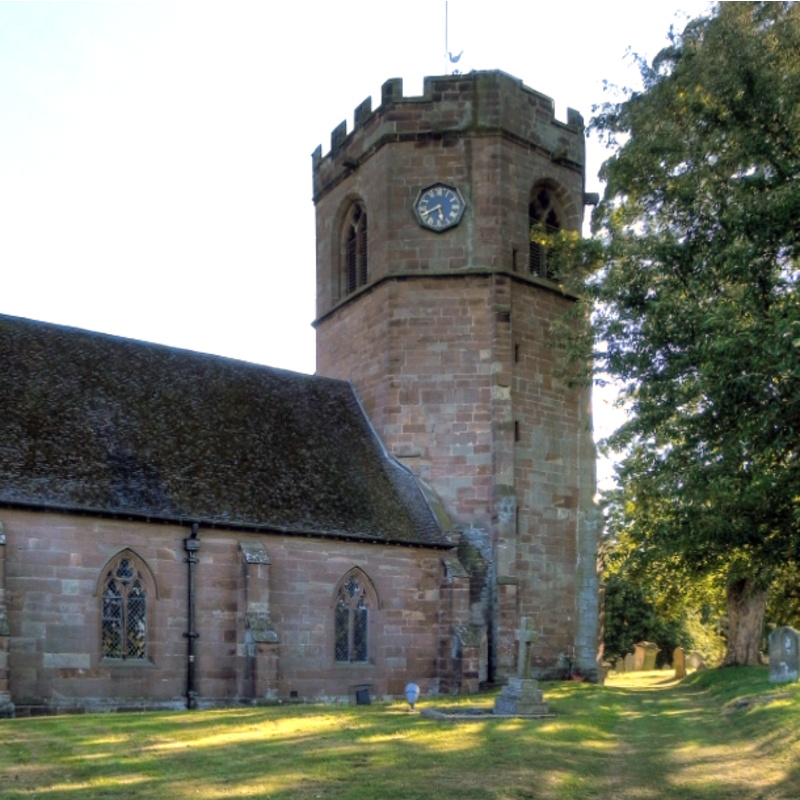
![Source caption: "St Luke's Church, Hodnet [...] The oldest part of the building (the south isle) dates from the 12th century. In the 14th century the church was remodelled, with the south isle chapel, nave, chancel and rare three-stage octagonal tower added. The church was restored in the latter half of the nineteenth century."](/static-50478a99ec6f36a15d6234548c59f63da52304e5/compressed/1161119002_compressed.png)
